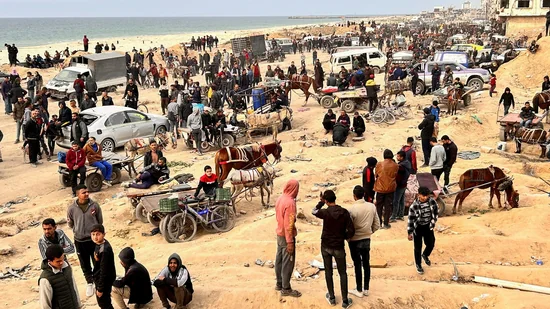On Thursday, Israeli occupation forces fired on a crowd of Palestinians racing to get food off an aid convoy in Gaza City, witnesses said. More than 100 people were killed, bringing the death toll since the start of the Israeli war on Gaza to more than 30,000, according to health officials. Israel said many of the dead were trampled in a chaotic stampede for the food aid and that its troops only fired when they felt endangered by the crowd.
The violence was quickly condemned by Arab countries and President Biden expressed concern it would add to the difficulty of negotiating a ceasefire in the nearly five-month conflict.
The Gaza City area was among the first targets of Israel’s air, sea and ground offensive, launched in response to Hamas’ Oct. 7 attack into Israel.
While many Palestinians fled the Israeli invasion in the north of the enclave, a few hundred thousand are believed to remain in the largely devastated and isolated region. Several deliveries of aid reached the area this week, officials said.
The deadly Israeli attack in Gaza City will likely fuel criticism of Israel when it comes to allowing aid in.
Aid groups say it has become nearly impossible to deliver supplies in most of Gaza because of the difficulty of coordinating with the Israeli military, ongoing hostilities and the breakdown of public order, with crowds of desperate people overwhelming aid convoys. The U.N. says a quarter of Gaza’s 2.3 million Palestinians face starvation; around 80 percent have fled their homes.
Military officials said the pre-dawn convoy of 30 trucks driving to northern Gaza were met by huge crowds of people trying to grab the aid they were carrying. Dozens of Palestinians were killed in the stampede, and some were run over by the trucks as the drivers tried to get away, said Rear Adm. Daniel Hagari, the chief military spokesperson.
Israeli troops guarding the area fired warning shots toward the crowd because they felt endangered, he said, according to an AP report.
“We didn’t open fire on those seeking aid,” he said. “Contrary to the accusations, we didn’t open fire on a humanitarian aid convoy, not from the air and not from land. We secured it so it could reach northern Gaza.”

Displaced Palestinians, who fled their houses due to Israeli strikes, shelter at a tent camp amid the ongoing of the Israeli assault on Gaza, in Rafah in the southern Gaza Strip, February 29. – Reuters
At least 112 people were killed, Gaza Health Ministry spokesman Ashraf al-Qidra said. The ministry described it as a “massacre” and said more than 700 others were injured.
Saudi Arabia, Egypt and Jordan accused Israel of targeting civilians in the incident. In separate statements, they called for increased safe passages for humanitarian aid. They also urged the international community to take decisive action to pressure Israel to abide by international law and to reach an agreement for an immediate ceasefire.

More than 100 people were killed and 700 injured in an overnight attack on a crowd of Palestinians rushing an aid convoy. AFP
The increasing alarm over hunger across Gaza has fueled international calls for a cease-fire, and the U.S., Egypt and Qatar are working to secure a deal between Israel and Hamas for a pause in fighting and the release of some of the hostages Hamas took during its Oct. 7 attack.
Mediators hope to reach an agreement before the Muslim holy month of Ramadan starts around March 10. But so far, Israel and Hamas have remained far apart in public on their demands.
In a statement condemning Thursday’s attack, Hamas said it would not allow the negotiations “to be a cover for the enemy to continue its crimes.”
This attack came more than a month after witnesses and health officials in Gaza accused Israeli troops of firing on a previous aid distribution in Gaza City, killing at least 20 people.
The Health Ministry said the Palestinian death toll from the Israeli war on Gaza has climbed to 30,035, with another 70,457 wounded.
Meanwhile, U.N. officials have warned of further mass casualties if Israel follows through on vows to attack the southernmost city of Rafah, where more than half of Gaza’s population of 2.3 million has taken refuge. They also say a Rafah offensive could decimate what remains of aid operations.
The World Food Program said earlier this month that it was pausing deliveries to the north because of the growing chaos, after desperate Palestinians emptied a convoy while it was en route.
U.N. and other relief agencies have complained that Israel has blocked or restricted their attempts to get aid in. The U.N. estimates that around a quarter of Gaza’s 2.3 million population is facing starvation since the outbreak of Israel’s war and blockade in the Gaza Strip.
Since launching its assault on Gaza following Hamas’ Oct. 7 attack, Israel has barred entry of food, water, medicine and other supplies, except for a trickle of aid entering the south from Egypt at the Rafah crossing and Israel’s Kerem Shalom crossing. Despite international calls to allow in more aid, the number of supply trucks is far less than the 500 that came in daily before the war.
– Wire services. Edited for style.






Leave a Reply